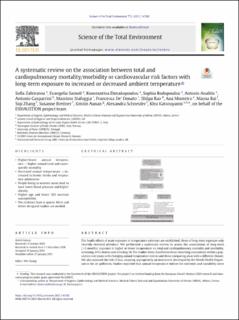| dc.contributor.author | Zafeiratou, Sofia | |
| dc.contributor.author | Samoli, Evangelia | |
| dc.contributor.author | Dimakopoulou, Konstantina | |
| dc.contributor.author | Rodopoulou, Sophia | |
| dc.contributor.author | Analitis, Antonis | |
| dc.contributor.author | Gasparrini, Antonio | |
| dc.contributor.author | Stafoggia, Massimo | |
| dc.contributor.author | De' Donato, Francesca | |
| dc.contributor.author | Rao-Skirbekk, Shilpa | |
| dc.contributor.author | Monteiro, Ana | |
| dc.contributor.author | Rai, Masna | |
| dc.contributor.author | Zhang, Siqi | |
| dc.contributor.author | Breitner, Susanne | |
| dc.contributor.author | Aunan, Kristin | |
| dc.contributor.author | Schneider, Alexandra | |
| dc.contributor.author | Katsouyanni, Klea | |
| dc.date.accessioned | 2022-07-26T13:25:19Z | |
| dc.date.available | 2022-07-26T13:25:19Z | |
| dc.date.created | 2021-04-06T10:44:29Z | |
| dc.date.issued | 2021 | |
| dc.identifier.citation | Science of the Total Environment. 2021, 772 1-17. | |
| dc.identifier.issn | 0048-9697 | |
| dc.identifier.uri | https://hdl.handle.net/11250/3008654 | |
| dc.description.abstract | The health effects of acute exposure to temperature extremes are established; those of long-term exposure only recently received attention. We performed a systematic review to assess the associations of long-term (>3 months) exposure to higher or lower temperature on total and cardiopulmonary mortality and morbidity, screening 3455 studies and selecting 34. The studies were classified in those observing associations within a population over years with changing annual temperature indices and those comparing areas with a different climate. We also assessed the risk of bias, adapting appropriately an instrument developed by the World Health Organization for air pollution. Studies reported that annual temperature indices for extremes and variability were associated with annual increases in mortality, indicating that effects of temperature extremes cannot be attributed only to short-term mortality displacement. Studies on cardiovascular mortality indicated stronger associations with cold rather than hot temperature, whilst those on respiratory outcomes reported effects of both heat and cold but were few and used diverse health outcomes. Interactions with air pollution were not generally assessed. The few studies investigating effect modification showed stronger effects among the elderly and those socially deprived. Comparisons of health outcome prevalence between areas reported lower blood pressure and a tendency for higher obesity in populations living in warmer climates. Our review indicated interesting associations between long-term exposure to unusual temperature levels in specific areas and differences in health outcomes and cardiovascular risk factors between geographical locations with different climate, but the number of studies by design and health outcome was small. Risk of bias was identified because of the use of crude exposure assessment and inadequate adjustment for confounding. More and better designed studies, including the investigation of effect modifiers, are needed. | |
| dc.language.iso | eng | |
| dc.title | A systematic review on the association between total and cardiopulmonary mortality/morbidity or cardiovascular risk factors with long-term exposure to increased or decreased ambient temperature | |
| dc.type | Peer reviewed | |
| dc.type | Journal article | |
| dc.description.version | publishedVersion | |
| dc.source.pagenumber | 1-17 | |
| dc.source.volume | 772 | |
| dc.source.journal | Science of the Total Environment | |
| dc.identifier.doi | 10.1016/j.scitotenv.2021.145383 | |
| dc.identifier.cristin | 1902273 | |
| dc.relation.project | EC/H2020/820655 | |
| cristin.ispublished | true | |
| cristin.fulltext | original | |
| cristin.qualitycode | 2 | |
